Launching of the project
- On June 14th, through our Non-Profit Organization named “UTPAT FOUNDATION”. We launched our Project AMHI Muli, (Awareness of menstrual health initiative). Interestingly AMHI means US/WE and Muli means Girls, thus the name of the Project AMHI Muli means US/WE GIRLS.
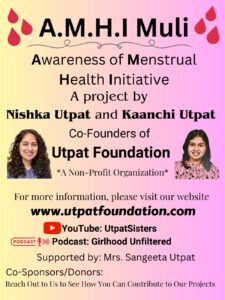
What is the aim of this project?
- The main aim of this project is to make Feminine Hygiene Products (Sanitary Pads) available to Middle-High school girls and at the same time use the opportunity provided through direct contact with the girls to educate them and raise awareness of menstrual hygiene and dispel misinformation.
Why did we choose this location?
- We chose to launch this project in an inner city part of Mumbai. It is a large, densely populated city on the East coast of India with a population of approximately 18 million. It is considered the Financial Capital of India (like New York is to USA)
- Although it is home to some of the richest people in the world, at the same time it is home to some of the poorest including one of the biggest slums called Dharavi. Similar to it is another area called “Chuna Bhatti” which also is the home of several working class, low income, urban poor families with many young girls of middle-to-high school ages; they don’t have access to many resources for schooling and personal hygiene purposes – particularly menstrual hygiene products. Even if these products are available to buy, they remain unaffordable for many of these girls which can compromise their school attendance and social lives.

- We decided to set our sights on this area in order to help these girls who have so much potential for bright futures if their school attendance isn’t compromised. We felt strongly that these are the girls that will benefit the most from our project so that they can pursue uninterrupted and avail any opportunities that the city provides to make progress in their life.
Why did we choose this date?
- Mid June is the beginning of a new school year in most parts of India, particularly the school attended by the girls we wanted to help in the part of Mumbai, named Chuna Bhatti.
- A Local Non Profit Organization “Swadhar” distributes notebooks, pencils, crayons, water bottles, shoes, crayons, school uniforms, etc. once a year at the beginning of the school year. This event is attended by the middle school-high school girls and their parents/guardians.
- What could be a better opportunity than this one, where we get to see the girls and parents and make direct contact with them to render help and convey our message at the same time! So we decided to collaborate with that organization to distribute sanitary pads to the same group of girls at the same event.
Who was present during the first launch and distribution?
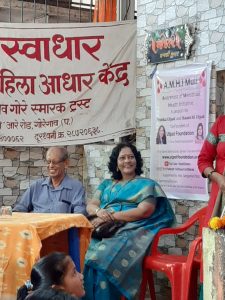
- We would have loved to be there in person for the launching of this project but due to the distance between here and Mumbai and being in school/college ourselves we couldn’t do so.
- So we did the next best thing by asking our local advisor and mentor to represent us and launch the project on our behalf. Mrs. Sangeeta and Mr. Yashwant Utpat represented our organization, the Utpat foundation, and distributed the feminine hygiene products to the school age girls on our behalf on the day. They are donors and supporters of the local Swadhar Organization as well.
Who is benefiting from this project AMHI MULI?
- It’s always a challenge to kick off the school year for these low income families since they don’t have access to certain necessities.
- The beneficiaries of this are the school girls that are currently being helpe
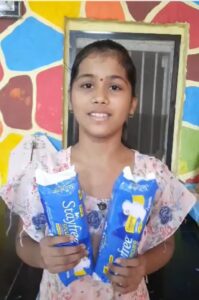 d by another Organization “Swadhar” which means “Self Reliance”, which distributes School supplies at the beginning of the school year to these. A few other girls in need, who are not in the pool of the girls receiving aid from Swadhar, are being helped by us as well and are receiving the sanitary pads through our project AMHI Muli, by The Utpat Foundation.
d by another Organization “Swadhar” which means “Self Reliance”, which distributes School supplies at the beginning of the school year to these. A few other girls in need, who are not in the pool of the girls receiving aid from Swadhar, are being helped by us as well and are receiving the sanitary pads through our project AMHI Muli, by The Utpat Foundation.
Recurring donation-due to recurrent need / How frequently are we going to donate?
- Taking this further, it’s a very noble thing that school supplies and clothes are being made available to these girls. But unlike pens and shirts and things which can be used for a long time.
- We are aware that feminine hygiene products are a recurring expense (you know, something that you need to keep repurchasing) and these girls may not be able to afford such products.
How does it help to keep girls in school?
- We’ve talked about this before – there’s a relationship between having access to these products and being able to attend school. Just like school supplies are a necessity to attend school, menstrual hygiene products are as well. How many times does a girl need to miss school just because she doesn’t have any resou
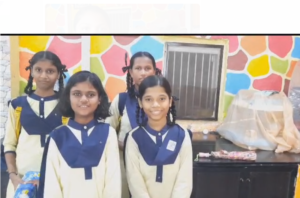 rces to manage her menstrual cycle?
rces to manage her menstrual cycle? - Well, we aimed to provide these girls with feminine hygiene products so they don’t have to miss school due to lack of sanitary pads.
- So we aim to continue making these products available on a monthly basis, at least until each girl finishes high school.
Where are the funds coming from / Who are current donors and where will the future donors come from?
- As the saying goes, charity begins at home. We decided to set an example by raising money on our own first and incurring the
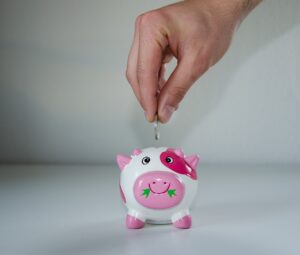 expenses ourselves. We have used our savings, money from piggy banks, and gift money we got from friends and families for funding this project in the initial phases. Our long term goal is to make this a self-sustained project through fundraising efforts and community involvement such as :
expenses ourselves. We have used our savings, money from piggy banks, and gift money we got from friends and families for funding this project in the initial phases. Our long term goal is to make this a self-sustained project through fundraising efforts and community involvement such as :
- A dollar to dollar match – if any sponsor is willing to donate a specific sum of money, we would find a way to raise a matching amount of money.
- We also hope that local philanthropists and businesses will pitch in and donate in cash or kind as part of their charity work.
Where do we buy the products from?
- Right now, we’ve been buying from local pharmacies, but we are planning on asking them to consider donating these menstrual hygiene products in
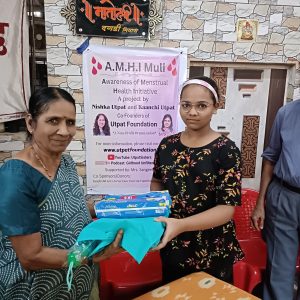 the future as we continue to buy more from them and establish a working relationship.
the future as we continue to buy more from them and establish a working relationship. - In the future, we hope to establish Sanitary pad making machines in community-based, small scale industries to manufacture high-quality, low-cost products locally.
What do we want to see happening through this project?/Our Vision for the future of this project
- Our hope is that these girls finish their high school uninterrupted, go on to pursue education in colleges and join the workforce and become completely self-reliant women.
- In turn, we hope that in future, they give a helping hand to the other girls of school-age, who will follow them in their path.
- The girls and their parents are already seeing the benefits of this project but in a matter of 3-6 months, we hope to hear from the girls if having access to these products made a difference in their education and school attendance.
- We also want to take this as an opportunity on a regular basis to educate the girls on the topic of menstruation and clear up some misconceptions and taboos. Our local representatives will meet up with the girls and talk to them in an open, unbiased manner to educate the girls further.
- We want to sow seeds of awareness and hopefully at some point, this can be carried forward through the generations by local leaders.
- When an opportunity presents itself, we hope to travel to India and meet up with all the girls, their parents and the leadership of our collaborating organizations and many other selfless volunteers who are vital to the launch and success of this project AMHI Muli by the Utpat Foundation.
1 thought on “A.M.H.I. Muli Project Launch”
What a wonderful, well thought out project and it’s vision for the future !!
Kudos to you girls for being the trendsetters of such an amazing idea !!
Comments are closed.